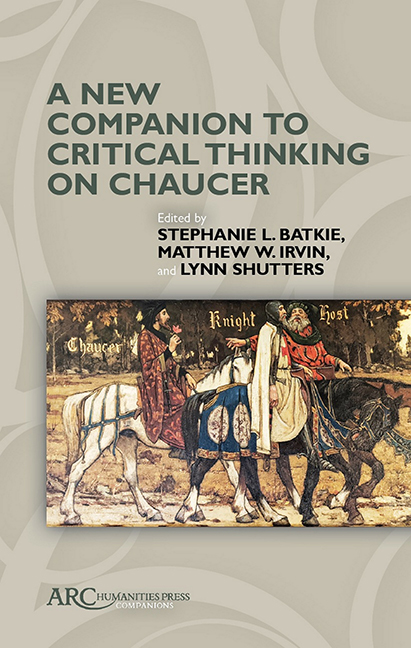Book contents
Vertu
Published online by Cambridge University Press: 21 October 2021
Summary
Knight's Tale
Tale of Melibee
DESPITE ITS POPULARITYin the Middle Ages, Chaucer's Melibee leaves many modern readers cold. Because it uses unpopular genres—allegory and proverb—and because it is explicitly didactic in seeking moral reform, it has been characterized as sententious, tedious, and boring. To be sure, “Chaucer's Tale of Melibee and Dame Prudence” (7.1889) poses interpretive challenges. Yet I suggest the main problem modern readers have with the tale comes down to Prudence. Despite insightful readings into her role as counsellor, modern readers balk at Prudence's advice just as much as Melibee does. For recent audiences, it is not that Prudence is simply a woman out of place, giving advice that she has no authority to offer. It is the advice itself that prompts dismissal, derision, and sometimes both. When recent scholars struggle to account for the Melibee's popularity in the Middle Ages, they point to a gulf between the values of modern and medieval audiences. This distance is genuine, I shall suggest, and relies on a medieval conception of virtue that we no longer recognize. Moderns continue to admire a model of virtue derived from the heroic, classical formulation of virtus, an ethical ideal that Chaucer explores in his Knight's Tale. Yet through its representation of Prudence, the Melibee promotes a vernacular conception of vertu, one that challenges virtus by suggesting the good person is vulnerable, open to contingency, and responsive to others.
Notwithstanding modern readers’ dissatisfaction, this essay will suggest Prudence's ethical subjectivity is more feminist than failure: to be sure, Prudence's subjectivity is ungratifying, but that is because her selfhood is patently, even performatively, unglorified. In a brief opening turn to Chaucer's Knight's Tale, I suggest reasons why audiences might find Prudence's subjectivity less than satisfying. As I detail, the vertuPrudence advocates stands against a heroic model of virtus, or that ethical tradition that centralizes masculine authority by privileging the empowered, individuated agent as the prime mover in ethical life. Quite famously, Chaucer appears to valorize Theseus's ability to order his world as an affirmation of his individual authority.
- Type
- Chapter
- Information
- A New Companion to Critical Thinking on Chaucer , pp. 171 - 186Publisher: Amsterdam University PressPrint publication year: 2021



